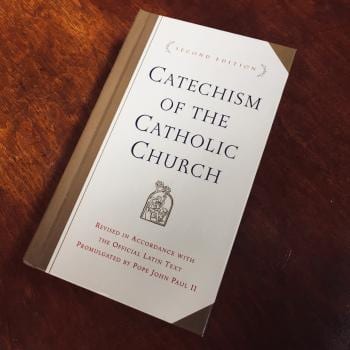Those who claim that it’s a sin for Catholic mothers to work frequently use an excerpt from the Roman Catechism, promulgated by the Catholic Church in 1566 due to a directive by the Council of Trent, to prove their claim that mothers shouldn’t work outside the home. The excerpt they cite is from the section “Holy Matrimony,” and goes as follows:
Duties Of A Wife
On the other hand, the duties of a wife are thus summed up by the Prince of the Apostles: Let wives be subject to their husbands. that if any believe not the word, they may be won without the word by the conversation of the wives, considering your chaste conversation with fear. Let not their adorning be the outward plaiting of the hair, or the wearing of gold, or the putting on of apparel: but the hidden man of the heart in the incorruptibility of a quiet and meek spirit, which is rich in the sight of God. For after this manner heretofore the holy women also, who trusted in God, adorned themselves, being in subjection to their own husbands, as Sarah obeyed Abraham, calling hint lord.
To train their children in the practice of virtue and to pay particular attention to their domestic concerns should also be especial objects of their attention. The wife should love to remain at home, unless compelled by necessity to go out; and she should never presume to leave home without her husband’s consent.
Again, and in this the conjugal union chiefly consists, let wives never forget that next to God they are to love their husbands, to esteem them above all others, yielding to them in all things not inconsistent with Christian piety, a willing and ready obedience.
The second paragraph, they say, means that mothers literally can’t leave their homes without direct permission from their husbands — no grocery shopping, no playdates, and especially no outside employment. (Oddly, however, I haven’t seen them claim that women who (a) braid their hair, (b) wear gold jewelry, and/or (c) wear nice clothing are sinning by doing so, despite the first paragraph clearly saying women shouldn’t do these things.)
Logical Problems
First, what if a husband gives his wife permission to work? The claim I hear most often is that it’s a sin for a mother to work outside the home absent grave necessity, but if we take the Roman Catechism absolutely literally, it’s only a sin if she does so without first obtaining her husband’s consent. As long as he gives permission, there shouldn’t be an issue, right? So why are they claiming that it’s working in and of itself that is a sin, when it’s actually failing to ask the husband’s consent?
Second, no pope has mentioned this alleged prohibition about women leaving their homes without their husband’s consent in their writings about working mothers or the duties of mothers — not Pope Leo XIII, not Pope Pius XI, etc. You’d think that if this stricture was still binding on all Catholic woman everywhere, it would at least have been mentioned occasionally in other writings. However, it isn’t.
Third, in its section on Holy Matrimony, the current Catechism of the Catholic Church says nothing at all about women being forbidden to leave their homes without the consent of their husband. If this stricture is still in force and binding upon all women, wouldn’t the current CCC — a document that, per the USCCB, is part of the Ordinary Magisterium — at least mention it?
Fourth, some translations of the Roman Catechism say that a woman should never “go abroad” without the permission of her husband. This could mean that a woman should not travel extensively, or leave the country to go on pilgrimage or similar, without the consent of her husband, not that she should never so much as step foot outside of her front door without her husband’s explicit permission.
The Bottom Line
The simple response to this claim is this: doctrine has developed since 1566. It is true that doctrine can’t change, but our understanding of the core principles of Catholic doctrine can, and does, develop. The newly-canonized St. John Henry Newman wrote an entire book about development of Christian doctrine.
The church has never taught as doctrine that mothers cannot work. What the Church has taught, and still teaches, is that mothers cannot neglect their responsibilities to their family. That core doctrine has never changed; our understanding of what that means, what those responsibilities are, and what constitutes neglect has developed over time.
Catholics Shouldn’t Use the Roman Catechism to Proof-Text
Protestant apologists are famous for proof-texting Scripture in order to back up their assertions, and that’s exactly what is happening here — Catholic doctrine is being proof-texted to support a certain assertion.
However, Catholic teaching by its very nature cannot be proof-texted. Pope Emeritus Benedict XVI called this concept the hermeneutic of continuity. Dr. Jeff Mirus, in his excellent article about this topic, says (emphasis mine):
This principle is unalterably opposed to any interpretive technique which severs one or more Magisterial texts (or one or more passages of Scripture) from other texts. Such a technique is, in fact, a “hermeneutic of rupture”. The right principle is a “hermeneutic of continuity”, and this principle lies at the heart of what it means to be a Catholic, what it means to think in a Catholic way.
He continues,
Just as all new expressions of the Magisterium of the Catholic Church must be understood in light of the authentic traditions from which they spring, so must past teachings be understood in light of the official teachings that emerge later in time to further elucidate a doctrinal issue.
In other words, we can’t take one paragraph from the Roman Catechism and completely ignore all other Magisterial writings on the topic. They all need to be read together, using proper exegesis, and taking into account all relevant historical and cultural context.
(I was going to add this to my previous post about Church teaching on working mothers, but it appears I’m not allowed to edit posts older than six months, so consider this post an addendum to my previous one.)












